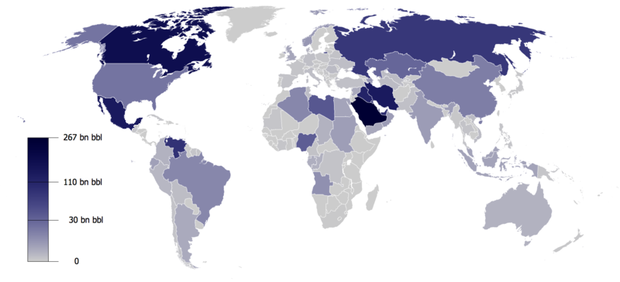Russia to remain major oil-producing nation at least until end of century
In the past few years, the number of new conventional oil discoveries have significantly decreased. The Ministry of Natural Resources and Environment estimates that Russia can deplete its current oil reserves by 2044. However, the country still has plenty of untapped resources waiting to be discovered. With these reserves, Russia may remain among the world's top oil producers throughout the entire 21st century.
The future of Russian crude lies in oil that is more expensive, more geologically complex and further away from traditional regions of production, considers Viktor Katona, an expert at the Russian International Affairs Council and contributor to Oilprice.com. According to estimates of the Ministry of Natural Resources and Environment, Russia's current oil reserves of 29bn tonnes can be depleted by 2044. The ministry doesn't take new discoveries into account, but globally, in the past two years, the world has seen the lowest level of new conventional oil discoveries since 1952. Russian oil and gas companies discovered 40 prospective fields in 2016, but all of them were relatively small.
At the moment, West Siberia is Russia's main oil producing region, but its share in the national output reduced to 57% from 71% in 2004-2005 while Eastern Siberia and offshore regions are increasing their shares. However, West Siberia is keeping stable output due to modernisation of oil recovery methods, and the region is still far from being exhausted.
Russia also has three new oil frontiers – shale, Arctic and deepwater reserves. Unfortunately, their exploration is constrained because producers have no access to new technologies related to these sectors due to Western sanctions. Yet it is very unlikely that even tightening sanctions could stall Russia's Arctic exploration activities for a long time, believes the author. The Russian part of the continental shelf contains most of the Arctic's oil formations and approximately 60% of its undiscovered reserves. Thus, the region will play an important role in keeping Russia among the world's top oil producers in the next 40-50 years.
Besides the Arctic, Russian oil industry has another prospective development direction. According to the latest data, the country's shale oil reserves are second only to the United States. The Bazhenov Formation, which is the largest shale deposit in the world, was first explored at the end of the 1960s, but the exploration of the country's tight oil deposits was hampered due to availability of less costly variants of production. Now it is expected that Russian service companies might be ready to exploit Russia's shale reserves by the 2020s. However, Russia's tight oil exploration requires oil prices of at least $55-60 per barrel while conventional oil is profitable at $20-30 per barrel already.
Finally, Russia's conventional oil reserves shouldn't be written off given enhanced oil recovery techniques and supplementary exploration. According to the author, Russia has every chance to keep its status of the key oil producing nation throughout the 21st century with oil production shifting to places that are further (north and east), deeper (both deepwater and pre-salt) and generally more costly.
 Map of world oil reserves, 2013. Photo: wikipedia.org
Map of world oil reserves, 2013. Photo: wikipedia.org